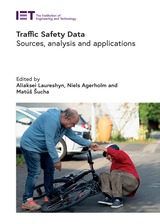8 start with H start with H
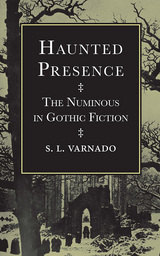
Varnado offers a fresh and audacious analysis of the literature of the supernatural by employing insights derived from the philosophy of religious experience. Ranging from the Gothic novel of the eighteenth century to ghostly tales from the nineteenth and twentieth centuries, Varnado frames ghost stories as ontological challenge to the reader. The challenge is not in the form of philosophical proposition, however. Rather it is in the form of feelings and emotions that maintain a connection with the sense of reality. It is this area of reality that Rudolph Otto called the numinous—the feeling of the supernatural—that stands at the center of Gothic literature.
An understanding of this unique category of experience, aligned with its associated concept of “the sacred and the profane,” exposes the purpose of ghostly literature and demonstrates the enduring relevance of this mesmerizing genre.
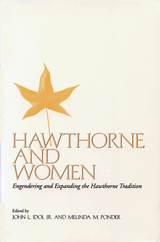
This collection of original essays presents a more complex and positive view of Hawthorne's attitudes toward women, demonstrating his recognition of the crucial role that women played--as critics, reviewers, readers, and authors--in building a national readership that made his writing career so successful.
The book begins with an examination of the influence exerted by the women in Hawthorne's immediate family. It goes on to explore his links to a broad range of women writers, as well as his attitudes toward the female characters he created. Among the authors discussed are Margaret Fuller, Harriet Beecher Stowe, Louisa May Alcott, Emily Dickinson, Sarah Orne Jewett, Willa Cather, Charlotte Perkins Gilman, George Eliot, Virginia Woolf, Flannery O'Connor, and Toni Morrison.

The present study of American, Australian, and Canadian detective fiction concerns literature which speaks in the ways of heroes and humanities about the human condition. All authors studied here, to one degree or another, demonstrate their concern with human society, some more strongly than others, but all with their eyes on the human situation and human existence. At times these studies lean toward the tragic in their outlook and development. In all instances they center on the humanistic.

Concentrating on the "go-between" function of the child in nineteenth- and twentieth-century American and British fiction, Virginia Blum shows how selected children in the works of L. P. Hartley, Charles Dickens, Henry James, and Vladimir Nabokov were actually fictional messengers who ultimately were unsuccessful at reconciling impasses in the adult world.
Throughout her book Blum draws on pop images of real and fictional children, ranging from the Baby Jessica case, in which the idea of "real" paternity and family bonds comes to the mythic fore, to the film Home Alone, in which the abandoned child becomes protector of his family's hearth and home. Hide and Seek raises provocative questions about the ways in which our culture fetishizes the idea of the child at the same time that we treat with comparative indifference the conditions under which many real children actually live.
"A work of striking originality and consistent intellectual honesty, forcing us into genuinely profound and darkly uncomfortable areas of speculation." -- James R. Kincaid, author of Child-Loving: The Erotic Child and Victorian
Culture
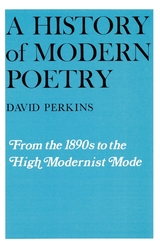
The first comprehensive history of modern poetry in English from the 1890s to the 1920s, this book embraces an era of enormous creative variety—the formative period during which the Romantic traditions of the past were abandoned or transformed and a major new literature created. By the end of the period covered, Eliot’s The Waste Land, Lawrence’s Birds, Beasts and Flowers, Stevens’s Harmonium, and Pound’s Draft of XVI Cantos had been published, and the first post-Eliot generation of poets was beginning to emerge.
More than a hundred poets are treated in this volume, and many more are noticed in passing. David Perkins discusses each poet and type of poetry with keen critical appreciation. He traces opposed and evolving assumptions about poetry, and considers the effects on poetry of its changing audiences, of premises and procedures in literary criticism, of the publishing outlets poets could hope to use, and the interrelations of poetry with developments in the other arts—the novel, painting, film, music—as well as in social, political, and intellectual life. The poetry of the United States and that of the British Isles are seen in interplay rather than separately.
This book is an important contribution to the understanding of modern literature. At the same time, it throws new light on the cultural history of both America and Britain in the twentieth century.

There have been many books on early modernist poetry, not so many on its various sequels, and still fewer on the currents and cross-currents of poetry since World War II. Until now there has been no single comprehensive history of British and American poetry throughout the half century from the mid-1920s to the recent past. This David Perkins is uniquely equipped to provide; only a critic as well informed as he in the whole range of twentieth-century poetry could offer a lucid, coherent, and structured account of so diverse a body of work.
Perkins devotes major discussions to the later careers of the first Modernist poets, such as Eliot, Pound, Stevens, and Williams, and to their immediate followers in the United States, E. E. Cummings, Archibald MacLeish, and Hart Crane; to W. H. Auden, Dylan Thomas, and the period style of the 1930s; to the emergence of the New Criticism and of a poetry reflecting its tenets in William Empson, John Crowe Ransom, Allen Tate, John Berryman, and Robert Lowell, and to the reaction against this style; to postwar Great Britain from Philip Larkin and the “Movement” in the 1950s to Ted Hughes, Charles Tomlinson, and Geoffrey Hill; to the theory and style of “open form” in Charles Olson and Robert Duncan; to Allen Ginsberg and the Beat poetry of the 1960s; to the poetry of women’s experience in Sylvia Plath and Adrienne Rich; to the work of Black poets from Robert Hayden and Gwendolyn Brooks to Amiri Baraka; and to Elizabeth Bishop, W. S. Merwin, A. R. Ammons, John Ashbery, and James Merrill.
Perkins discusses some 160 poets, mentioning many others more briefly, and does not hesitate to explain, to criticize, to admire, to render judgments. He clarifies the complex interrelations of individuals, groups, and movements and the contexts in which the poets worked: not only the predecessors and contemporaries they responded to but the journals that published them, the expectations of the audience, changing premises about poetry, the writings of critics, developments in other arts, and the momentous events of political and social history. Readers seeking guidance through the maze of postwar poetry will find the second half of the book especially illuminating.
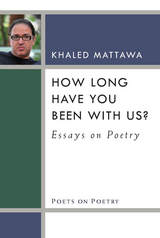
A volume in the Poets on Poetry series, which collects critical works by contemporary poets, gathering together the articles, interviews, and book reviews by which they have articulated the poetics of a new generation.
“Like the myriad companions and comrades that he summons from their exile, Khaled Mattawa is himself a ‘poet-stranger.’ In the essays, ‘written in a poet’s prose,’ collected in How Long Have You Been With Us, Mattawa evokes a powerful amalgam of the personal intimacy of the solitary and the political challenge of solidarity.”
—Barbara Harlow, University of Texas at Austin
“If you’ve read about exile, you’ve read about Brodsky and Milosz—just as, if you’ve read about translation, you’ve read about Walter Benjamin and George Steiner. While Khaled Mattawa has mastered these masters, his essays about world literature serve as a tour of the rest of the world. He introduces you to the writers you haven’t heard of but should from contemporary Libya and colonial South Asia to Latin America and China. When Mattawa invokes Saadi Youssef or Rabinidrath Tagore, Mohja Kahf or Toru Dutt, the effect is to deprovincialize American literature.”
—Ken Chen, The Asian American Writers’ Workshop
Khaled Mattawa, an American poet of Libyan origin, explores various dynamic developments shaping American poetry as it is being practiced today. Arising from an incredibly diverse range personal backgrounds, lyric traditions, and even languages, American poetry is transforming into a truly international form. Mattawa, who also translates Arabic poetry into American English and American poetry into Arabic, explores the poetics and politics of cross-cultural exchange and literary translation that fostered such transformation. The essays in this collection also shed light on Mattawa’s development as a poet and provide numerous portraits of the poets who helped shaped his poetry.
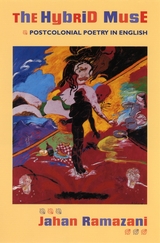
In The Hybrid Muse, Jahan Ramazani argues that postcolonial poets have also dramatically expanded the atlas of literature in English, infusing modern and contemporary poetry with indigenous metaphors and creoles. A rich and vibrant poetry, he contends, has issued from the hybridization of the English muse with the long resident muses of Africa, India, and the Caribbean. Starting with the complex case of Ireland, Ramazani closely analyzes the work of leading postcolonial poets and explores key questions about the relationship between poetry and postcolonialism. As inheritors of both imperial and native cultures, poets such as W. B. Yeats, Derek Walcott, Louise Bennett, A. K. Ramanujan, and Okot p'Bitek invent compelling new forms to articulate the tensions and ambiguities of their cultural in-betweeness. They forge hybrid figures, vocabularies, and genres that embody the postcolonial condition.
Engaging an array of critical topics, from the aesthetics of irony and metaphor to the politics of nationalism and anthropology, Ramazani reconceptualizes issues central to our understanding of both postcolonial literatures and twentieth-century poetry. The first book of its kind, The Hybrid Muse will help internationalize the study of poetry, and in turn, strengthen the place of poetry in postcolonial studies.
READERS
Browse our collection.
PUBLISHERS
See BiblioVault's publisher services.
STUDENT SERVICES
Files for college accessibility offices.
UChicago Accessibility Resources
home | accessibility | search | about | contact us
BiblioVault ® 2001 - 2025
The University of Chicago Press



